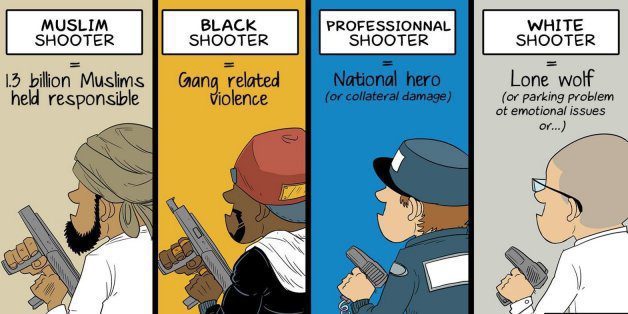Stephen Paddock, a white 64 year old man, killed at least 50 people at a Las Vegas music festival this Sunday. U.S. media were quick to label it “one of the deadliest mass shootings” in this country’s history.
At a press conference held in the aftermath of the attack, Las Vegas Sherriff Joe Lombardo said they would not be treating this shooting as terror-related. Lombardo justified this decision by saying: “We believe it was a local individual. He resides here locally. We don’t know what his belief system was at this time.”
Translation: the killer wasn’t a foreigner, and we don’t know if he’s a Muslim yet. Nobody can be a terrorist unless they’re an immigrant or a refugee within the logic of the U.S. state.
Was Timothy McVeigh not also a “local individual?” A New York native, McVeigh was the architect of the 1995 Oklahoma bombing that killed 168 people, the deadliest terror attack until September 11, 2001. Paddock may or may not be categorized as a terrorist, but that question surely should not rest on whether “he was a local.” One should look into ideological motivations, meaning did the attacker in question commit his crime for a specific political reason? McVeigh, who went as far as to write an extensive manifesto, justified his actions by wanting to instigate a revolution. Still, McVeigh was not charged with terrorism.
Las Vegas has seen its fair share of violence recently. In 2014, Jerad and Amanda Miller went on a shooting rampage that killed five people including two police officers. The Millers, who harbored anti-government and white supremacist sentiments, draped one officer with a swatiska and Gadston flag and laid a note on the other that read “this is the start of the revolution.” Jerad Miller had been outspoken about his ideological beliefs on social media prior to the shooting. He posted videos of him rambling about government and left-wing conspiracies, and took part in the April 2014 Bundy standoff .
How did the media react to these murder-suicides, given their highly political nature? The Millers were, without fail, referred to either as “shooters” or “gunmen” across U.S. media platforms from Fox News to the Washington Post.
Take as a counter example the case of Omar Mateen, the American man, who like McVeigh, was born in New York. He was responsible for the death of 49 people at an Orlando, FL, gay nightclub. He was instantly denounced as a terrorist by government officials, even though evidence now shows that he was deeply mentally disturbed, and had been romantically rejected at that nightclub earlier. His religious affiliation, coupled with his non-American sounding name, were enough to label him a terrorist by media–from the left and right–over McVeigh or the Millers.
Why is there such hesitation in describing white perpetrators of mass violence as terrorists, and a burning desire to label Arabs or Muslims as such? Xenophobia and white supremacy permeates the highest level of Western governance, which has yet to shake its colonial-era superiority and which has become part and parcel of society and the media.
Referring to Sunday’s Las Vegas terrorist Paddock, Lombardo went as far as using the term “lone wolf,” a term nearly exclusively deployed in regards to white terrorists. One can only imagine the backlash on minority communities would have been had the shooter turned out to be a person of color or from non-European descent.
Labeling a white psychopath a terrorist would require an examination of the role of white supremacy in Western society, labeling a Muslim or Arab–the distinction of these two categories being very much lost on the media and polity–as such enables the US Empire to justify wars, mass surveillance, and the loss of civil liberties. The state has much to gain by labeling any “foreigner” as a terrorist, and much to lose by admitting its own white supremacist ideology can inspire violence and death.
